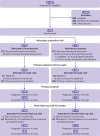Use of proton pump inhibitors to treat persistent throat symptoms: multicentre, double blind, randomised, placebo controlled trial
- PMID: 33414239
- PMCID: PMC7789994
- DOI: 10.1136/bmj.m4903
Use of proton pump inhibitors to treat persistent throat symptoms: multicentre, double blind, randomised, placebo controlled trial
Abstract
Objective: To assess the use of proton pump inhibitors (PPIs) to treat persistent throat symptoms.
Design: Pragmatic, double blind, placebo controlled, randomised trial.
Setting: Eight ear, nose, and throat outpatient clinics, United Kingdom.
Participants: 346 patients aged 18 years or older with persistent throat symptoms who were randomised according to recruiting centre and baseline severity of symptoms (mild or severe): 172 to lansoprazole and 174 to placebo.
Intervention: Random blinded allocation (1:1) to either 30 mg lansoprazole twice daily or matched placebo twice daily for 16 weeks.
Main outcome measures: Primary outcome was symptomatic response at 16 weeks measured using the total reflux symptom index (RSI) score. Secondary outcomes included symptom response at 12 months, quality of life, and throat appearances.
Results: Of 1427 patients initially screened for eligibility, 346 were recruited. The mean age of the study sample was 52.2 (SD 13.7) years, 196 (57%) were women, and 162 (47%) had severe symptoms at presentation; these characteristics were balanced across treatment arms. The primary analysis was performed on 220 patients who completed the primary outcome measure within a window of 14-20 weeks. Mean RSI scores were similar between treatment arms at baseline: lansoprazole 22.0 (95% confidence interval 20.4 to 23.6) and placebo 21.7 (20.5 to 23.0). Improvements (reduction in RSI score) were observed in both groups-score at 16 weeks: lansoprazole 17.4 (15.5 to19.4) and placebo 15.6 (13.8 to 17.3). No statistically significant difference was found between the treatment arms: estimated difference 1.9 points (95% confidence interval -0.3 to 4.2 points; P=0.096) adjusted for site and baseline symptom severity. Lansoprazole showed no benefits over placebo for any secondary outcome measure, including RSI scores at 12 months: lansoprazole 16.0 (13.6 to 18.4) and placebo 13.6 (11.7 to 15.5): estimated difference 2.4 points (-0.6 to 5.4 points).
Conclusions: No evidence was found of benefit from PPI treatment in patients with persistent throat symptoms. RSI scores were similar between the lansoprazole and placebo groups after 16 weeks of treatment and at the 12 month follow-up.
Trial registration: ISRCTN Registry ISRCTN38578686 and EudraCT 2013-004249-17.
© Author(s) (or their employer(s)) 2019. Re-use permitted under CC BY. No commercial re-use. See rights and permissions. Published by BMJ.
Conflict of interest statement
Competing interests: All authors have completed the ICMJE uniform disclosure form at www.icmje.org/coi_disclosure.pdf and declare: some authors had financial support from the Health and Technology Assessment programme of the National Institute for Health Research for the submitted work; no financial relationships with any organisation that might have an interest in the submitted work in the previous three years; no other relationship or activities that could appear to have influenced the submitted work.
Comment in
-
PPI bei Halsbeschwerden nicht besser als Placebo.Laryngorhinootologie. 2022 Oct;101(10):778-779. doi: 10.1055/a-1873-5695. Epub 2022 Sep 29. Laryngorhinootologie. 2022. PMID: 36174563 German. No abstract available.
References
Publication types
MeSH terms
Substances
Grants and funding
LinkOut - more resources
Full Text Sources
Other Literature Sources
Medical

